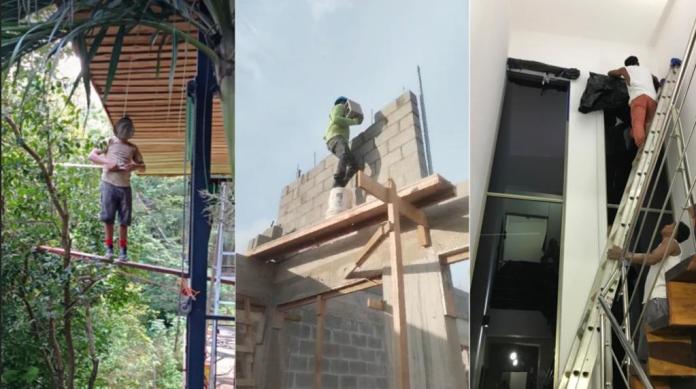QCOSTARICA (SemanarioUniversidad) Guanacaste leads the ranking of new constructions in the country so far this year with 1.3 million square meters, but the explosive expansion of real estate constructions for tourism has little moved the balance in favor of people’s living conditions. locals, while workers point out poor working conditions.
While the Federated College of Engineers and Architects of Costa Rica (CFIA) records significant growth in this sector, surveys record an increase in poverty and extreme poverty in the area.
– Advertisement –
Extreme poverty in the Chorotega Region went from 7.9% to 10.5% between 2022 and 2023, according to data from the National Household Survey of the National Institute of Statistics and Censuses (INEC).
The small community of Marbella in Santa Cruz – 20 kilometers from a gas station, ATM or clinic – has changed little in the last three years with private real estate developments built a few meters away and hidden among the forests.
Santa Cruz is the canton with the most new constructions in 2023 with 615 thousand square meters registered and the previous year it ranked second, with 551 thousand. Marbella residents estimate that growth has been accelerated and visible in the last three to four years.
One of these constructions is the Lomas del Sol condominiums, which aim to create a “unique private community” hidden among the forests with the sale of thousands of dollar houses frequently used for tourist rentals in the area.
The exclusivity guarantees maintaining the privacy of the owners and also the working conditions in which the constructions are carried out, which, according to workers in the area, are unsafe and do not guarantee them adequate income or social guarantees.
“There are several companies (construction companies within the condominium) and they do not treat us very well, they do not forgive. I came from San José, I am here out of necessity and I have to endure because work is low,” commented Luis Alberto Lopez.
– Advertisement –
Semanario Universidad spoke with construction workers from Marbella after their workday, who did not mind giving their name: “It doesn’t matter here, neither security nor the Ministry of Labor falls.”

Salaries are not recovered
The workers who attend the activity are those who earn the least, but, regardless of the role they occupy in the work, there is a significant deterioration in salary and working conditions since the pandemic, said worker Arvin Pérez.
Lopez said he earns 1,300 per hour as an assistant, 13 thousand per day with an hour of lunch and 15 minutes of coffee. Entry and exit to the hidden private community is usually managed by each worker; some are given a place to live, but others must rent.
– Advertisement –
Photos and videos obtained by this weekly newspaper from the workers show them performing high-risk maneuvers at heights without safety equipment and they say they do not have life insurance or the necessary social guarantees.
In the case of operators, who are workers with greater experience and expertise, the salary is around two thousand colones per hour, Pérez commented. Even independently, it is not usual to ask for all the benefits because “they don’t give you the job.”
“The pay is not very good compared to other places, they do not pay benefits such as bonus or insurance, they are supposed to compensate that a little with the salary,” said Pérez, a 44-year-old Nicaraguan who works as an operator.
Pérez says that, before the pandemic, he used to work in Santa Teresa where “they paid very well” for the work of an operator and he used to charge 3,700 per hour, but with the pandemic it went down and “that’s how it stayed,” because the improvements have been few and only in some jobs.

Juan Carlos Ovares, a 46-year-old construction master who comes from Tilarán, said that as a construction master he usually earns 3,000 an hour and works 10 hours a day, but that he is currently an operator because the work “is slow even as an assistant.”
Manuel Rojas, another construction worker, agreed: “They bring them from somewhere else and they pay them less. They say they provide an insurance policy, but it is a lie because when there is an accident we transport them by motorcycle and take them to private care. “If they died they wouldn’t be able to hide it.”
The workers also stated that, on occasions, they have been asked to hide from the authorities and report having economic difficulties because those who settle in the area find the cost of living high.
“Here things are expensive, because of transportation, a gallon of gasoline costs four thousand colones,” Rojas commented.
Little development in the community
The commerce in the center of Marbella is made up of two grocery stores, a soda and a real estate office where houses are sold within condominiums in developments such as Costa Dorada or Lomas del Sol.
These developments are just 3 kilometers from the community’s commerce, but the panorama of the premises “has changed little compared to 10 years ago,” according to José Genaro Sotela, 77 years old.

“It is the only source of work because everything is long. Yes, there are many Nicaraguans working, Ticos too, but few,” she added.
Katherine Angulo, who works inside the condominiums providing maintenance, says that those who buy or vacation in the rental houses “like” that the community is maintained this way and that it is not “like Tamarindo.”
Angulo also pointed out that construction jobs are usually given to foreigners or workers who come from San José, but she also mentioned that there are jobs in security, cleaning and gardening in which Costa Ricans tend to work more frequently.
However, they are also subject to poor working conditions without social guarantees, according to neighbors. UNIVERSIDAD also spoke with a provider of cleaning services in houses under construction, who pointed out that it is not possible to improve conditions with the pay and instability of seasonal work.
“There is no money to pay for policy and insurance. They pay 2 thousand per hour without a contract and the number of hours is not known, the number of hours depends on the house and the outing, it can be from 8 to 12 and I usually include two or three girls, because it is a micro company, or four in a big house and it depends on the season,” he commented.
Translated and adapted from SemanarioUniversidad.com. Read the original in Spanish here.
– Advertisement –
Source link
Q Costa Rica



